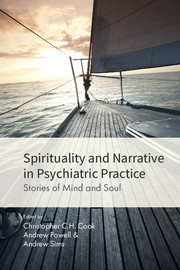Book contents
- Frontmatter
- Contents
- List of contributors
- Foreword
- Preface
- 1 Narrative in psychiatry, theology and spirituality
- 2 Spirituality and transcultural narratives
- 3 Psychopathology and the clinical story
- 4 Helping patients tell their story: narratives of body, mind and soul
- 5 Gods lost and found: spiritual coping in clinical practice
- 6 Stories of joy and sorrow: spirituality and affective disorder
- 7 Stories of fear: spirituality and anxiety disorders
- 8 Stories of transgression: narrative therapy with offenders
- 9 Narratives of transformation in psychosis
- 10 My story: a spiritual narrative
- 11 God's story revealed in the human story
- 12 Meaning without ‘believing’: attachment theory, mentalisation and the spiritual dimension of analytical psychotherapy
- 13 Stories of living with loss: spirituality and ageing
- 14 Beginnings and endings
- Index
5 - Gods lost and found: spiritual coping in clinical practice
Published online by Cambridge University Press: 02 January 2018
- Frontmatter
- Contents
- List of contributors
- Foreword
- Preface
- 1 Narrative in psychiatry, theology and spirituality
- 2 Spirituality and transcultural narratives
- 3 Psychopathology and the clinical story
- 4 Helping patients tell their story: narratives of body, mind and soul
- 5 Gods lost and found: spiritual coping in clinical practice
- 6 Stories of joy and sorrow: spirituality and affective disorder
- 7 Stories of fear: spirituality and anxiety disorders
- 8 Stories of transgression: narrative therapy with offenders
- 9 Narratives of transformation in psychosis
- 10 My story: a spiritual narrative
- 11 God's story revealed in the human story
- 12 Meaning without ‘believing’: attachment theory, mentalisation and the spiritual dimension of analytical psychotherapy
- 13 Stories of living with loss: spirituality and ageing
- 14 Beginnings and endings
- Index
Summary
Historically, religion and spirituality have not been treated particularly kindly by mental health practitioners and theorists, being described as passive and defensive in character and oriented towards denying rather than confronting the realities of life (Pargament & Park, 1995). Albert Ellis, the founder of rational emotive therapy, had this to say: ‘the conclusion seems inescapable that religiosity is, on almost every conceivable count, opposed to the normal goals of mental health’ (1986: p. 42). In the past 25 years this critical view has given way to a more balanced perspective. Ellis himself recanted his uniformly negative stance. The shift in view may be in part due to the emergence of a significant body of empirical research linking religion and spirituality to better health and well-being in many groups, including clinical populations (Koenig et al, 2012).
This chapter focuses on one significant domain of research and its implications for clinical practice: the cognitive and relational domains of spiritual coping. We begin with a brief review of theory and research in the area of spiritual coping, particularly as it applies to people dealing with mental health problems (for more comprehensive reviews see Cummings & Pargament, 2010; Pargament, 2011; Gall & Guirguis-Younger, 2013). We then present two narrative accounts of spiritual coping in clinical practice, which illustrate different patterns of spiritual coping and different directions in treatment. We conclude by considering ways to foster greater sensitivity among mental health professionals to the important place of spirituality in treatment.
Theory and research on spiritual coping
Prevalence of spiritual coping
The adage that there are no atheists in foxholes is not wholly correct. Even in an event as horrific as the Holocaust, some people reported themselves to be non-believers before, during and well after this trauma (Brenner, 1980). Yet, though it is not a universal rule, the spiritual impulse is often quickened during times of greatest stress. This holds true not only for the general population but also for people with serious psychiatric problems. In one study, 30% of patients described an increase in their religious faith following the development of a psychiatric illness (Kirov et al, 1998).
- Type
- Chapter
- Information
- Spirituality and Narrative in Psychiatric Practice , pp. 53 - 66Publisher: Royal College of PsychiatristsPrint publication year: 2016



